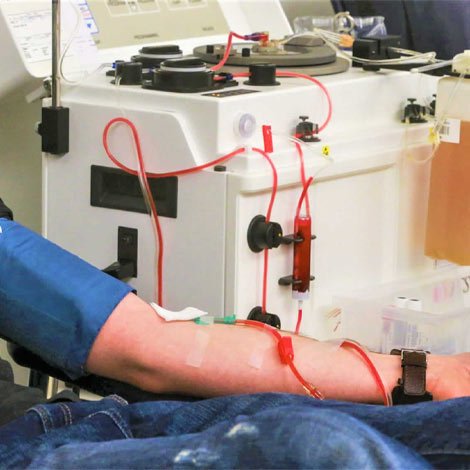Best Hemodialysis Hospital in Vijayawada
What is Hemodialysis?
Hemodialysis is a medical procedure that helps remove waste products, toxins, and excess fluids from the blood when the kidneys fail to function adequately. It is one of the most common renal replacement therapies for patients suffering from chronic kidney disease (CKD) or end-stage renal disease (ESRD). During the process, a machine called a dialyzer (or artificial kidney) filters the blood through a special membrane and returns the cleaned blood back to the body.
This treatment typically takes place in a dialysis center under the supervision of a nephrology specialist. Most patients require hemodialysis three times a week, with each session lasting 3 to 5 hours, depending on individual health needs.
How Hemodialysis Works
During hemodialysis, a patient's blood is pumped through a dialyzer. The dialyzer contains a semipermeable membrane that allows waste products and extra water to pass through while retaining necessary components like red blood cells and essential proteins. A special fluid called dialysate helps in removing unwanted substances from the blood. After filtration, the blood is returned to the body via a different pathway.

Who Needs Hemodialysis?
- Patients with severe chronic kidney disease
- Individuals with end-stage renal failure
- Those with acute kidney injury that doesn’t resolve quickly
- Patients awaiting kidney transplantation
Benefits of Hemodialysis
- Removes toxins and waste from the blood
- Balances electrolyte levels
- Reduces symptoms like swelling, fatigue, and shortness of breath
- Improves quality of life in kidney failure patients
Risks and Considerations
Although hemodialysis is lifesaving, it comes with some risks such as low blood pressure, cramps, infections at the vascular access site, and dietary restrictions. It’s crucial for patients to follow dietary guidelines and maintain fluid intake limits as prescribed by their nephrologist.
What is Plasmapheresis?
Plasmapheresis is a medical procedure that involves the removal, treatment, and return or exchange of blood plasma from the bloodstream. Also known as therapeutic plasma exchange (TPE), it is used to treat various autoimmune and neurological disorders where abnormal antibodies are present in the blood.
In plasmapheresis, a machine separates the plasma from the blood cells. The harmful components in the plasma, such as autoantibodies, immune complexes, or toxins, are removed. The clean plasma, or a plasma substitute like albumin or donor plasma, is then re-infused into the patient’s bloodstream.
When is Plasmapheresis Needed?
- Autoimmune diseases like lupus or myasthenia gravis
- Neurological conditions such as Guillain-Barré syndrome
- Kidney diseases like Goodpasture’s syndrome or rapidly progressive glomerulonephritis
- Blood disorders involving abnormal proteins or clotting factors
How the Procedure Works
The process is similar to dialysis. Blood is drawn through a needle and passed through a machine that separates the plasma from blood cells. The filtered plasma or replacement fluid is returned through another vein. A single session can last 1.5 to 3 hours, and the frequency depends on the condition being treated.
Advantages of Plasmapheresis
- Removes harmful antibodies or substances from the plasma
- Reduces disease activity and severity
- Improves symptoms of autoimmune and inflammatory conditions
- Can be used in conjunction with other treatments
Risks and Side Effects
Potential side effects include low blood pressure, infection, allergic reactions to plasma substitutes, and bleeding problems. It is important for the procedure to be conducted in a well-equipped setting under specialist supervision.
Dr. M.V. Viswanath – Nephrology Doctor in Vijayawada
Dr. M.V. Viswanath is a leading nephrologist in Vijayawada, known for his clinical expertise in managing kidney-related conditions, including chronic kidney disease, dialysis management, and autoimmune kidney disorders. With years of experience in nephrology, Dr. Viswanath offers comprehensive and personalized care for patients requiring hemodialysis, plasmapheresis, or other renal interventions.
His compassionate approach, coupled with evidence-based treatment protocols, makes him one of the most sought-after kidney specialists in the region. Dr. Viswanath stays updated with the latest medical developments and ensures that each patient receives accurate diagnosis and optimal treatment.
Veda Hospital & Kidney Centre – Dialysis Hospital in Vijayawada
Veda Hospital & Kidney Centre is a premier nephrology and dialysis hospital in Vijayawada offering state-of-the-art care for patients with kidney diseases. Equipped with modern dialysis machines and advanced diagnostic facilities, the hospital provides specialized treatments such as hemodialysis, plasmapheresis, CRRT, and peritoneal dialysis.
The hospital maintains strict infection control protocols, experienced staff, and 24/7 availability of nephrology experts, making it a reliable destination for critical and long-term kidney care. Whether it's outpatient dialysis or emergency nephrology services, Veda Hospital focuses on quality care and patient comfort.
Specialized Kidney Care Services
- Hemodialysis and emergency dialysis services
- Plasmapheresis and blood purification therapies
- Management of chronic and acute kidney disease
- Kidney biopsy and evaluation
- Comprehensive nephrology consultations
What is the difference between Hemodialysis and Plasmapheresis?
Hemodialysis removes waste and excess fluids from the blood, mainly for kidney failure patients. Plasmapheresis targets abnormal plasma components such as autoantibodies and is used in autoimmune or immune-mediated disorders.
How long does a Hemodialysis session take?
Each hemodialysis session typically lasts 3 to 5 hours and is performed three times a week.
Is Hemodialysis painful?
Hemodialysis itself is not painful, though the needle insertion may cause minor discomfort. Some patients may feel tired afterward.
How often is Plasmapheresis required?
The frequency varies depending on the condition being treated. It may range from daily sessions to weekly or monthly treatments.
Can Hemodialysis be done at home?
Yes, home hemodialysis is an option for some patients, but it requires training, equipment, and support. Not all patients are eligible for home dialysis.
What dietary restrictions are needed during Hemodialysis?
Patients need to limit fluid intake and avoid high potassium, phosphorus, and sodium foods. A renal dietician can provide specific guidance.
Are there any alternatives to Hemodialysis?
Other alternatives include peritoneal dialysis and kidney transplantation. The choice depends on the patient's condition and medical suitability.
Is Plasmapheresis safe for children?
Yes, plasmapheresis can be safely performed in children under expert supervision, especially for pediatric autoimmune or kidney conditions.
How to choose the best Dialysis Hospital in Vijayawada?
Look for a facility with experienced nephrologists like Dr. M.V. Viswanath, modern dialysis infrastructure, infection control, emergency support, and patient care excellence—like Veda Hospital & Kidney Centre.
Best healthcare providers

Unmatched Nursing Support

Top-notch Patient Care

Hospitable environment

Phenomenal intervention

